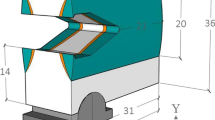Abstract.
Since the residual stress (RS) relaxation during and after fatigue can be highly detrimental to the life of components, a study of its variation in welding, after cyclic loading, simulating the operating conditions, has been carried out. Plates of S96QL ferritic steel were investigated in as-welded conditions and subject to 350-MPa load for 100 cycles. Both have composition 0.17% C, 0.8% Cr, 2% Ni, a yield stress of about 1015 MPa and were welded with the mechanised TIG technique. The critical points for rupture are usually the notches at the weld toe even if much higher tensile residual stresses can be found mostly in the centre of the weld seam. However, the relaxation of the residual stresses in the weld seam was examined to understand the mechanisms which lead to residual stress relaxation under quasistatic and cyclic loading. A transverse-to-weld scan was done at mid-depth to identify the maximum RS, which turned out to be both in the heat-affected zone and at the weld centre. A through-depth scan was performed to follow the RS profile in both points. Results show that stresses decrease in the fatigued specimen: tensile stresses relax to moderate values below 300 MPa and compressive ones to below 100 MPa. Especially in the weld, the degree of triaxiality decreases in the tensile region, after loading, which implies a lower risk to crack initiation and void formation. The experimental results match very well to the results of surface and subsurface measurements by means of X-ray diffraction after electrochemical polishing.
Similar content being viewed by others
Author information
Authors and Affiliations
Additional information
Received: 18 July 2001 / Accepted: 12 March 2002
RID="*"
ID="*"Corresponding author. (Fax: +33-476/207-648, E-mail: bruno@ill.fr) Present address: Institute Laue–Langevin, BP 156, 38042 Grenoble, France
Rights and permissions
About this article
Cite this article
Bruno, G., Nitschke-Pagel, T. The residual stress relaxation after fatigue in fine-grained steels . Appl Phys A 74 (Suppl 1), s1388–s1390 (2002). https://doi.org/10.1007/s003390201788
Issue Date:
DOI: https://doi.org/10.1007/s003390201788




